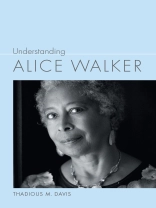Understanding Alice Walker serves both as an introduction to the Pulitzer Prize and National Book Award winner’s large body of work and as a critical analysis of her multifaceted canon. Thadious M. Davis begins with Walker’s biography and her formative experiences in the South and then presents ways of accessing and reading Walker’s complex, interconnected, and sociopolitically invested career in writing fiction, poetry, critical essays, and meditations.
Although best known for her novel The Color Purple and her landmark essays In Search of Our Mothers’ Gardens: Womanist Prose, Walker began her career with Once: Poems, The Third Life of Grange Copeland, and In Love and Trouble: Stories of Black Women. She has remained committed not merely to writing in multiple genres but also to conveying narratives of the hope and transformation possible within the human condition and as visualized through the lens of race and gender.
Davis traces Walker’s literary voice as it emerges from the civil rights and feminist movements to encourage an individual and collective search for justice and joy and then evolves into forceful advocacy for world peace, spiritual liberation, and environmental conservancy. Her writing, a rich amalgamation of the cutting-edge and popular, the new-age and difficult, continues to be paradigm shifting and among the most important produced in the last half of the twentieth century and among the most consistently prophetic in the first part of the twenty-first century.
Om författaren
Thadious M. Davis, Geraldine R. Segal Professor of American Social Thought, Emerita, and professor of English at the University of Pennsylvania, is the author or editor of 13 books, including Southscapes: Geographies of Race, Region, and Literature.












